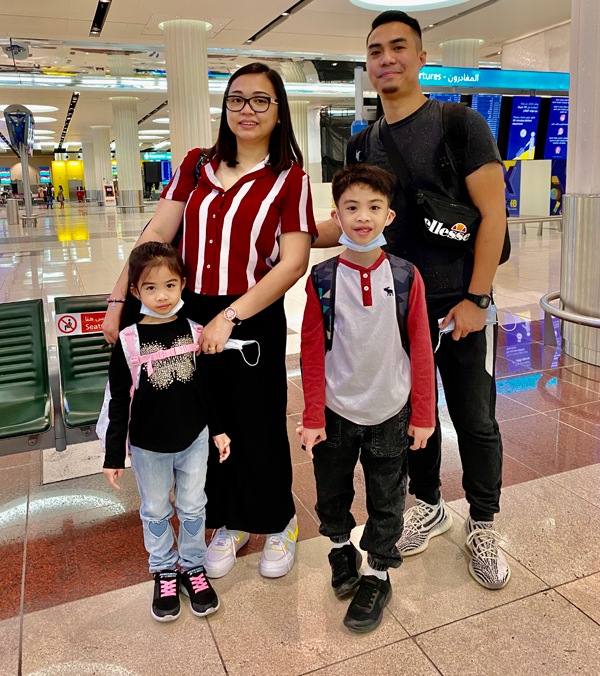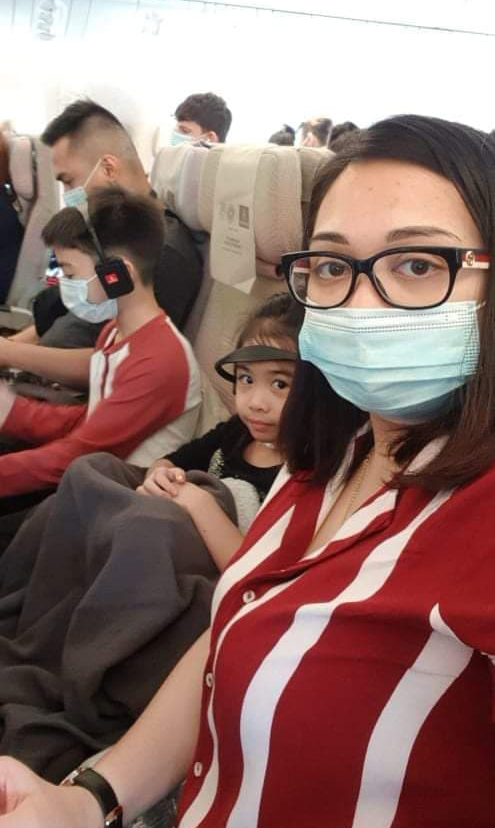Migrating from Dubai to Vancouver
Migrating from Dubai to Vancouver

Rosemarie Delos Santos and family at the Dubai
International Airport
(Photos provided)
By Rosemarie Delos Santos
As told to Irish Mae Silvestre
Of all the scenarios Rosemarie Delos Santos, 33, envisioned that could affect their immigration to Canada, a global pandemic was not one of them.
Born and raised in Dubai, Delos Santos recently left the place she called home and relocated to Vancouver with her husband Arvin, 32, and son Royce, 7, and daughter Arianna, 4. Delos Santos talks about flight cancellations, Dubai’s strict lockdowns, the struggles of OFWs in the UAE and the first thing they plan to do at the end of their quarantine period.
———————————-
“We started our application in 2017 under the federal skilled worker program. My husband is in sales and account management and I’m in HR. Our application went as expected.
After we got the confirmation in December 2018, we got our visas stamped and we had to land in Canada within three months. When we landed in Vancouver in February it was quite cold, which was a bit of a shock for us. We couldn’t do much, we just got our SIN but couldn’t do things like open bank accounts. We went back to Dubai because we needed time to save up and moving in the middle of the school year wasn’t ideal.

The family on their flight to Canada
The pandemic started affecting Dubai around February then from March to April, we were under strict lockdown. Non-essential workers were encouraged to work from home and schools were shut. Juggling work and the children’s online classes was the biggest challenge.
In terms of jobs among OFWs, the situation’s really bad.
The Filipino community was giving out groceries and cooked meals. There’s also a group that barters their things for groceries and they’d give these groceries to Filipinos in need. The Philippine Consulate was giving out cash as well. We’re members of Couples for Christ and we collected money and distributed them to members who lost their jobs. In our cluster alone, around 500 people lost their jobs. Until now, people are losing their jobs.
During what they called the national sterilization program, if you wanted to do groceries you had to apply online for a permit at least the day before, stating where you live and where you’re going. Sometimes there were checkpoints to ensure you have your permit on your phone.
Only one person per household was allowed to do the groceries. Some supermarkets have sanitation booths where you walk through a mist of sanitation. There were fines for not wearing masks and being outside past curfew. There were fines for not social distancing. There were fines if you had more than three people in a car, unless they’re family. Hosts can be fined 5,000 dirhams (1,800 Canadian dollars) for having friends over or having parties.
By the time we were leaving, restrictions had eased a little and we had a lot of farewell dinners. On weekends, malls got quite crowded.
We became accustomed to not seeing our friends; it dulled down the emotional impact of leaving. When you haven’t seen them for four to five months and you keep in touch through video calls, it’s practically the same. I imagined that leaving Dubai and our friends would be emotional and heart-breaking but because of COVID-19, we got used to not seeing them. It only truly hit us when we were at the airport and we said our goodbyes outside. I feel like we’re still missing a little bit of closure.
Our initial booking was with Air France, which got cancelled. We’re still waiting for the refund. The Emirates flight we were on was full. There was no social distancing. We had to have our masks on throughout the flight. I was scared about the questions they’d ask at the airport when we arrived, but they just asked us if we had a place to stay and if we can have food and groceries delivered. They told us that an officer might call us to check if we’re fulfilling our self-isolation plan. That’s it. It was pretty easy and not as gruelling as I thought it would be.
Before we left, we had secured an apartment in Richmond through a video call tour with the real estate agent. Our friends [from Dubai who now live in Vancouver] really helped us out the first few days. They brought us some food and dropped it off at our door, so we had a lot of the essentials: rice, canned goods and stuff for the kids. We also use apps like Instacart, order from Walmart or have food delivered from Uber Eats.
The biggest difference I noticed here in Vancouver is that masks are not mandatory. In Dubai, masks are mandatory and there are temperature checks everywhere you go before you enter a building or a restaurant.
The kids are handling the quarantine well, probably because they’re used to it. Our quarantine ends soon and the first thing we’re going to do is shop for more furniture, apply for our BC services card and go whale watching. We’re relieved and excited to be here because this has been our dream. We’re itching to go out and enjoy the outdoors. We’re happy and can’t wait to start our lives here.”
Comments (0)